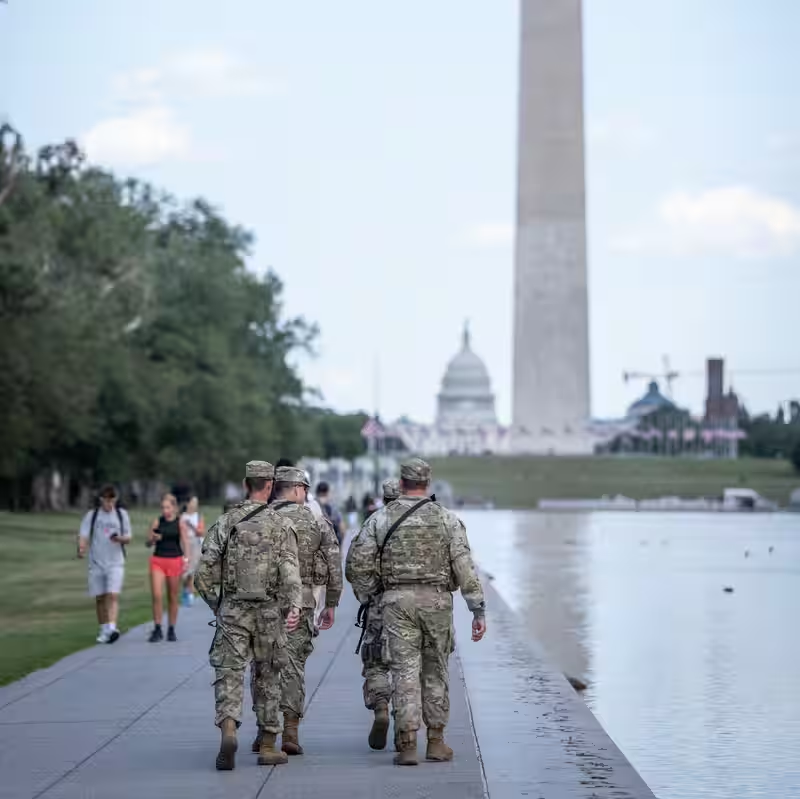Table of Contents
- Arrest Over a Movie Theme
- Lawsuit Cites First and Fourth Amendments
- Viral Protests and Creative Resistance
- ACLU Weighs In on Constitutional Rights
- Sources
Arrest Over a Movie Theme
In a scene that could have been ripped straight from a satirical sketch, Washington, D.C. resident Sam O’Hara found himself in handcuffs—not for violence, trespassing, or even shouting—but for playing the Star Wars “Imperial March” while filming National Guard troops.
The incident occurred on September 11, 2025, as O’Hara, 35, stood in a D.C. neighborhood documenting the presence of National Guard soldiers deployed under President Trump’s orders. With his phone in one hand and a Bluetooth speaker blasting Darth Vader’s iconic theme in the other, O’Hara’s peaceful protest quickly gained traction online—amassing millions of views on TikTok before it even ended.
According to court documents, Ohio National Guard Sgt. Devon Beck confronted O’Hara, warning that he would call police if the music didn’t stop. When O’Hara continued, Metropolitan Police Department officers arrived and placed him in handcuffs—though he was later released without charges.
Star Wars Protester Sues Over Constitutional Violations
On October 23, 2025, O’Hara filed a federal lawsuit against both the D.C. Metropolitan Police and members of the National Guard, alleging violations of his First and Fourth Amendment rights.
“The law might have tolerated government conduct of this sort a long time ago in a galaxy far, far away,” the lawsuit reads, quoting the famous Star Wars opening crawl. “But in the here and now, the First Amendment bars government officials from shutting down peaceful protests, and the Fourth Amendment… bars groundless seizures.”
The suit seeks compensatory damages for false arrest and unlawful detention, arguing that O’Hara’s expressive conduct—however cheeky—was protected political speech.
Viral Protests and Creative Resistance
O’Hara’s protest is part of a broader wave of creative, meme-driven dissent in the nation’s capital following the controversial deployment of National Guard troops.
Other notable examples include:
- A stand-up comedian cracking jokes to stoic guardsmen at Union Station (“It’s good to be here in Iraq,” he deadpanned).
- A woman pretending to mistake a military Humvee for her Uber ride: “I swore they said a ‘tan Toyota.’”
- A viral video overlaying the voice of “Hanoi Hannah” over footage of guardsmen picking up trash, with the caption: “It is a very good idea to leave a sinking ship.”
These acts—blending satire, performance art, and civic critique—have resonated widely on social media, turning everyday citizens into symbols of nonviolent resistance.
ACLU Weighs In on Constitutional Rights
O’Hara is being represented by the Washington, D.C. chapter of the American Civil Liberties Union (ACLU). Attorney Michael Perloff emphasized that humor and irony are not just protected—they’re essential to democratic discourse.
“The government doesn’t get to decide if your protest is funny,” Perloff said in a statement, “and government officials can’t punish you for making them the punchline. That’s really the whole point of the First Amendment.”
Legal experts note that while authorities can impose reasonable time, place, and manner restrictions on protests, they cannot suppress speech simply because it’s mocking or unconventional—especially when no laws are broken.




